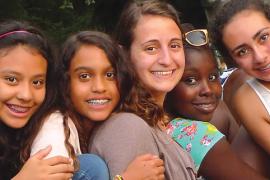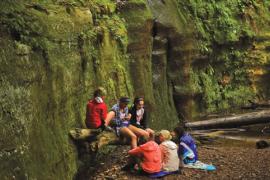In his book The 7 Habits of Highly Effective People, Stephen Covey describes Habit 2, “Begin with the End in Mind,” as a valuable approach to just about anything in life. For example, if you want to do a great job on a school project, first decide what the great finished project will look like. Then you can create the action plan for the steps you need to take to reach the project outcome you’ve envisioned.
Likewise, by looking at the really big picture of your life, you can envision its end and consider the blueprint you need to implement to get the life you want. Ask yourself, “What is it that I want to be remembered for?” It may sound morbid, but asking yourself how you want people to remember you — what you want your legacy to be — helps guide your actions today.
I suggest starting each new endeavor of your life with this “Begin with the End in Mind” habit. For the summer you are about to begin, ask yourself, “How do I want to be remembered by my campers?”
Take a few minutes to write down two or three ways you’d like to be described by your campers when they’re telling their friends or parents about you after camp is over. Be as specific as possible.
Once you have your short, descriptive list, write specific things you can do or say (action steps) that could lead campers to describe you that way. Maybe you were a camper yourself and have vivid memories of what you loved about your favorite counselors. What was it you liked best about them?
Not Just a Camp Counselor
While many of your peers will be making daily Starbucks runs at their impressive-sounding internships this summer, you will be gaining far more life experience and leadership practice as a camp counselor.
Your job is much more important than any office internship, and you will gain skills that will help you in your future career and relationships, including (information from Camp Director Alison Moeschberger’s article, The Greatest Internship: Six Critical Skills Counselors Develop at Camp, 2019):
- Responsibility: There is no greater responsibility than caring for other people’s children. You are responsible for the 24-hour care of your cabin groups. You have a very significant presence on the camp’s organizational chart, and your work with campers is essential to camp’s operation.
- Teamwork: Camp provides a unique opportunity where you live, work, and play together. The friendships you develop over the summer will be some of your strongest and most long-lasting relationships. You learn to live in community with people who have very different personalities and life experiences. You adapt and learn to work well with a range of people.
- Creativity and Problem-Solving: Whether it’s altering the plan for the day because of weather or figuring out a more efficient way to move ten children from one place to another, you are constantly provided with opportunities to solve problems and be creative. You must be flexible and think quickly when alternative solutions are required.
- Communication Skills: Without the distraction of technology and social media, you will strengthen your communication skills by engaging in face-to-face interaction with campers and fellow counselors. You learn how to lead group discussions and practice conflict resolution almost daily.
- Leadership: Children want and need positive role models in their lives. You are closer in age to campers than most of their adult role models at home, and the unique relationships you can form are hugely influential as campers navigate adolescence. You will be forced to examine yourself and be able to share important life lessons with your campers. You need to remain appropriate in your language and appearance at all times, and living closely with children may cause you to see yourself from a different perspective. It is a powerful experience to be a role model for a child.
- Selflessness: The nature of the camp counselor job is humbling. Your primary focus is on the safety and happiness of the campers in your care, at the expense of personal freedom and privacy. The selflessness practiced at camp will make you happier and more fulfilled. We often hear that counselors feel like the best version of themselves because of camp.
Louise Fritts Johnson, in her Camping Magazine article “Tackle Your Camp Counselor Job with an Internship Mindset” (2016), discusses additional management and business skills camp counselors build, including public speaking, handling tense interactions, humility and patience, staying and keeping others informed, and time management.
If you’re concerned about being just a camp counselor, reconsider how you think and talk about your role. This job you are starting offers the opportunity to build many skills that translate into any career path you eventually choose.
Planning for a Successful Summer
This will be my 34th summer welcoming staff to my camp and guiding them to learn about a culture and a job that I believe changes the world for the better.
Although I don’t know the exact outcomes for each individual counselor, I do know that among those arriving, some will:
- Fall in love with camp life and come back for many summers to come.
- Meet their best friend or future spouse.
- Decide to change their major and career trajectory to something working with kids.
- Get closer to nature, to others, and to themselves.
Unfortunately, there will also be several who won’t fulfill the commitment they’ve made to work at camp this summer. I’m a runner, and in races, when someone doesn’t complete the course, instead of a time next to their name, they get a “DNF, as in did not finish.” They won’t finish their summer at camp for a variety of reasons.
Four Reasons Counselors DNF
Because I don’t want you to be among the DNFs this summer at your camp, I’m going to share reasons why some counselors do not finish, along with advice about how you can avoid being in that group.
One: Self-Focus
For any college student or 20-something, most of life is self-focused and appropriately so. You have only yourself to take care of most of the time. So, it can be a shock to your system to suddenly have these other people — children — whose care and happiness you need to put ahead of your own. This shift in thinking is too much for some young adults who prefer to just focus on themselves.
To avoid being self-focused:
- Ask questions of others: “How can I help?”
- Reflect on the big “why” of your job: Why did you decide to work at camp? What impact do you want to have? (Hint: Look at what you wrote for the first exercise, “Begin with the End in Mind.”)
Two: Not Willing to Adjust to the Camp Culture
Just a few days into camp last summer, two counselors came to tell me they were quitting because it was “too happy” at camp, and there was “too much singing and dancing.” I suspect there was more to their decision. During training, we had reviewed our drug and alcohol policies. I think they were shocked to realize that such policies (which they had read and signed) would, in fact, be the reality of their summer. They had signed up for healthy fun, but that’s not what they wanted. They did not want to adjust their behavior — which would require getting out of their comfort zone — to immerse themselves in the culture.
I have countless other examples from the past three decades of staff members who, for whatever reason, felt their individual decisions and ideas superseded the culture of camp and the needs of the campers.
To adjust to camp culture:
- Take a “fresh start” approach: Many people use a summer at camp to reinvent themselves for the better. If you need to make some adjustments to your habits, language, or behavior to contribute positively to camp, why not consider trying on some new, more positive habits?
- Always think about the reason behind your role this summer. What is the greater purpose behind your job? What positive impact are you hoping to have?
Three: Poor Self-Care
You applied for this job and agreed that you have the physical, mental, and emotional stamina to successfully complete the summer despite the rigorous demands of the schedule and the work. If you make poor decisions about self-care, including how you spend your time off, how much sleep you get, how much water you drink, and what foods you eat, you will be so exhausted and depleted that you won’t be able to do the great job you need to do with your campers. You may even get sick.
To take good care of yourself this summer:
- Sleep.
- Drink plenty of water.
- Rest/reflect/recharge during time off.
- Pace yourself.
- Address mental health struggles with professional support.
Four: Defensive about Feedback
For counselors accustomed to getting excellent grades in every class, it can be difficult to accept constructive feedback about their job performance. The very best counselors I’ve ever worked with have actively sought feedback. I remember a first-year counselor from the UK asking me, “What can I do better?” Wow. That floored me.
To avoid getting defensive about feedback:
- Proactively seek it out.
- Receive it with a spirit of knowing nobody is perfect. When it comes from a place of care, feedback can be invaluable.
This summer could, at times, feel like it will go on forever. Even after three decades, I still experience the “training week that never ends” feeling. But, as every experienced camp counselor will tell you, it’s only the first weeks of the summer that seem to drag on. Once you get into your new routine of life at camp and become comfortable in your role as a camp counselor, the days and weeks will start to fly by.
Before you know it, you will be at the end of the summer. How will you know if your summer as a camp counselor has been a success?
Your campers describe you the way you said you wanted to be described at the start of your summer. You learned about yourself, challenged yourself, and gained some skills that you will use throughout your life.
Discussion Questions |
|
Photo courtesy of Camp DeWolfe, Wading River, New York.
References
Johnson, L. F. (2016, May/June). Tackle your camp counselor job with an internship mindset. Camping Magazine. Retrieved from ACAcamps.org/resource-library/camping-magazine/tackle-your-camp-counselor-job-internship-mindset
Moeschberger, A. (2019, January 27). The greatest internship: Six critical skills counselors develop at camp. Gold Arrow Camp. Retrieved from goldarrowcamp.com/the-greatest-internship/
Audrey Monke, with her husband, Steve, has owned and directed Gold Arrow Camp (Lakeshore, California) for 34 years. On her website, Sunshine-Parenting.com, Audrey shares resources for parents and youth development professionals about summer camp, parenting, and happiness. Her podcast features interviews with parenting authors and experts, including camp directors. Audrey’s book, Happy Campers: 9 Summer Camp Secrets for Raising Kids Who Become Thriving Adults (Hachette-Center Street, 2019; available for purchase May 9) shares strategies for bringing the “magic” of camp home.



